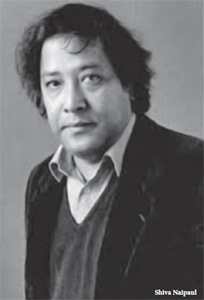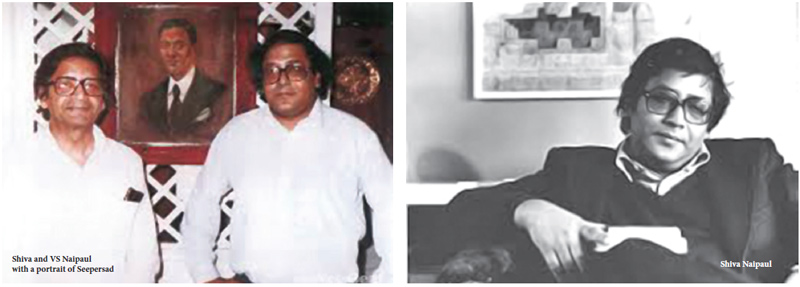|
July 2015

Issue Home >>
|

 In the academic world, work dedicated to Shiva Naipaul has been greatly overshadowed by that focussing on his older brother, VS Naipaul, a position Shiva Naipaul anticipated and rescinded, as the quotes gathered on the Friends of Mr Biswas website illustrate (http://www.friendsofmrbiswas.org/pages/shiva-and-vidia-my-brother-and-i). In the academic world, work dedicated to Shiva Naipaul has been greatly overshadowed by that focussing on his older brother, VS Naipaul, a position Shiva Naipaul anticipated and rescinded, as the quotes gathered on the Friends of Mr Biswas website illustrate (http://www.friendsofmrbiswas.org/pages/shiva-and-vidia-my-brother-and-i).
Such sibling-overwhelming is rather unfortunate because Shivadhar Srinivasa Naipaul, aka Shiva Naipaul, benefitted from the literary experiences of his family and from inception his voice was strong and his crafting unique. In fact, his very first novel, Fireflies, published when he was twenty-four years old, was longlisted for the Lost Man Booker Prize 1970 and won the Jock Campbell New Statesman Award, the John Llewellyn Rhys Memorial Prize and the Winifred Holtby Prize.
In the sixteen years between that first book and his death at the young age of forty, he wrote two other outstanding novels, The Chip Chip Gatherers in 1973 and A Hot Country in 1983, which was re-published in 1985 under the new title Love and Death in a Hot Country. Between these two novels, using his brother’s well-worn methodology of following the surging tides of displaced humanity to first write the travel narrative that fosters later fiction, he wrote two. North of South: An African Journey (1978) describes his visits to Kenya, Tanzania and Zambia, and Black and White (1980) tells about his travels in Guyana prompted by the Jonestown massacre.
The latter was republished in 1981 with the title Journey to Nowhere. It provided the research material on which A Hot Country/ Love and Death in a Hot Country is based and reminds us of what Paul Fussell says in Abroad: “To speak of ‘literary traveling’ is almost a tautology, so intimately are literature and travel implicated with each other” (212). In 1984, a collection of short stories and essays Beyond the Dragon’s Mouth was published and in 1986, the year following his death, another collection of essays, especially about his travels in Australia and Sri Lanka, An Unfinished Journey, was released.
Like his brother and many others, such as Isak Dinesen aka Baroness Karen Blixen whose life readers may be familiar with from exposure to the movie, Out of Africa starring Meryl Streep, Shiva Naipaul has been criticised, especially for his travel writing on Africa. Nonetheless his writing is considered outstanding. The travel writing prize that has been named in his honour – The Shiva Naipaul Memorial Prize – awarded annually by The Spectator is an indication of this and the criteria for the prize are worth noting. As Tom Coote puts it on his travel writing website: “the prize is not awarded for travel writing in the conventional sense. You need not have gone anywhere highly exotic or far away: the prize is for ‘the most acute and profound observation of a culture alien to the writer.”
Certainly, regardless of its genre or a culture’s alienness, the works of the three Naipauls share this quality. In addition, as Michael Joseph Chukwudalu Echeruo notes with regard to the writer of the foreign novel of Africa, he (sic) “uses the distanced peoples and lands of his narrative to make assertions of a large and general kind about human life and human values.” Distancing to this effect is a predominant element of the Naipauls’ writing, and as I have mentioned elsewhere, in the father’s writing it primarily “demonstrate(s) his Brahminic knowledge of Hindu traditions as well as the Brahmin right to violate the explicit rules of community cohesion by criticism, which in the traditional sense paradoxically speaks to the strength of a community that can withstand and incorporate such criticism” (Maharaj, 2008, 182). The stage for the sons’ work is however a much larger one and the criticism is less linked to religion.
Nevertheless, it incorporates the same moral, ethical stance. In relation to Shiva Naipaul’s work as a whole, one may argue in fact that he develops a theme of postcolonial pusillanimity, demonstrates its pervasiveness in a variety of societies that have recently been declared independent and opposes it by illustrating the many ways it is detrimental in a variety of scenarios and fatal in those situations that require its exact opposite: moral courage. We will pick up on this important note next month in the lead up to the conference - Seepersad & Sons: Naipaulian Creative Synergies, which is being hosted by The Friends of Mr Biswas in conjunction with the Department of Literary, Cultural and Communication Studies of the St Augustine campus of The UWI.
Editor’s Note: The original date for the conference of 6-8 September has been reconsidered by organizers due to the national election which has been scheduled for 7 September. The new dates are 28-30 October, 2015.
Dr J. Vijay Maharaj is a cultural and literary analyst who works in the Department of Literary, Cultural and Communication Studies.

|





